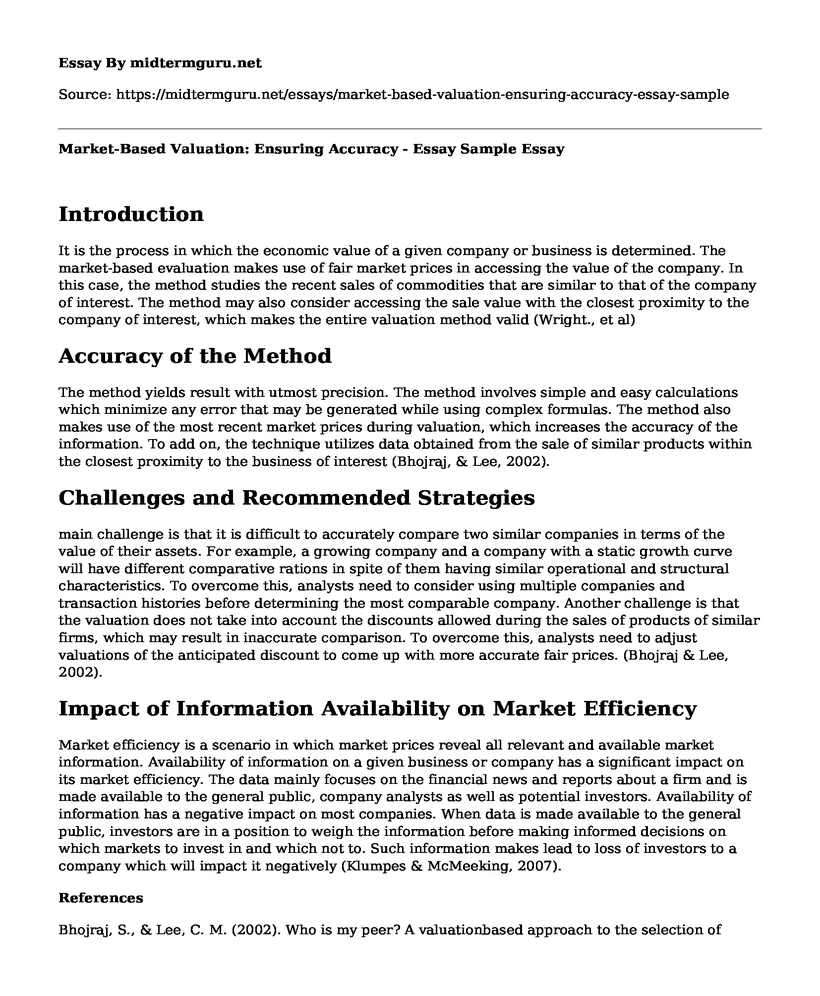Introduction
It is the process in which the economic value of a given company or business is determined. The market-based evaluation makes use of fair market prices in accessing the value of the company. In this case, the method studies the recent sales of commodities that are similar to that of the company of interest. The method may also consider accessing the sale value with the closest proximity to the company of interest, which makes the entire valuation method valid (Wright., et al)
Accuracy of the Method
The method yields result with utmost precision. The method involves simple and easy calculations which minimize any error that may be generated while using complex formulas. The method also makes use of the most recent market prices during valuation, which increases the accuracy of the information. To add on, the technique utilizes data obtained from the sale of similar products within the closest proximity to the business of interest (Bhojraj, & Lee, 2002).
Challenges and Recommended Strategies
main challenge is that it is difficult to accurately compare two similar companies in terms of the value of their assets. For example, a growing company and a company with a static growth curve will have different comparative rations in spite of them having similar operational and structural characteristics. To overcome this, analysts need to consider using multiple companies and transaction histories before determining the most comparable company. Another challenge is that the valuation does not take into account the discounts allowed during the sales of products of similar firms, which may result in inaccurate comparison. To overcome this, analysts need to adjust valuations of the anticipated discount to come up with more accurate fair prices. (Bhojraj & Lee, 2002).
Impact of Information Availability on Market Efficiency
Market efficiency is a scenario in which market prices reveal all relevant and available market information. Availability of information on a given business or company has a significant impact on its market efficiency. The data mainly focuses on the financial news and reports about a firm and is made available to the general public, company analysts as well as potential investors. Availability of information has a negative impact on most companies. When data is made available to the general public, investors are in a position to weigh the information before making informed decisions on which markets to invest in and which not to. Such information makes lead to loss of investors to a company which will impact it negatively (Klumpes & McMeeking, 2007).
References
Bhojraj, S., & Lee, C. M. (2002). Who is my peer? A valuationbased approach to the selection of comparable firms. Journal of accounting research, 40(2), 407-439.
Klumpes, P. J., & McMeeking, K. (2007). Stock Market Sensitivity to UK Firms' Pension Discounting Assumptions. Risk management and insurance review, 10(2), 221-246.
Wright, M., Lockett, A., Pruthi, S., Manigart, S., Sapienza, H., Desbrieres, P., & Hommel, U. (2004). Venture capital investors, capital markets, valuation and information: US, Europe and Asia. Journal of International Entrepreneurship, 2(4), 305-326.
Cite this page
Market-Based Valuation: Ensuring Accuracy - Essay Sample. (2023, Jan 17). Retrieved from https://midtermguru.com/essays/market-based-valuation-ensuring-accuracy-essay-sample
If you are the original author of this essay and no longer wish to have it published on the midtermguru.com website, please click below to request its removal:
- Sony Corporation in Australia - Paper Sample
- Compare and Contrast Essay on Verizon vs AT&T
- Employee Insurance in Germany: Deduction, Funds, and Coverage - Essay Sample
- Chile: The Highest Ranked Economy in Latin America - Essay Sample
- The Success of an Organization: Balancing Stakeholder & Management Roles - Essay Sample
- Leadership Strategies for Change: Achieving Success in an Organizational Transition - Essay Sample
- Apple Outsmarts Microsoft: How Apple Gained Competitive Advantage - Essay Sample







